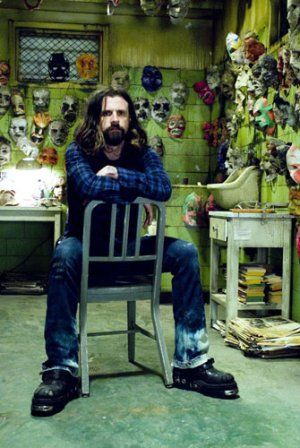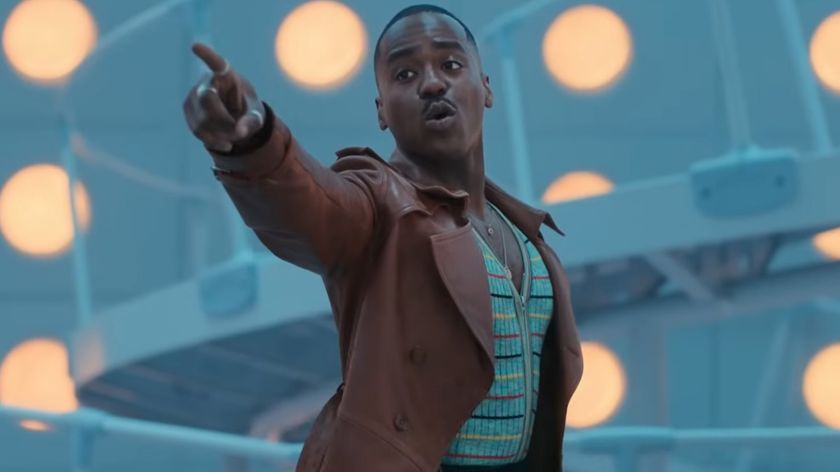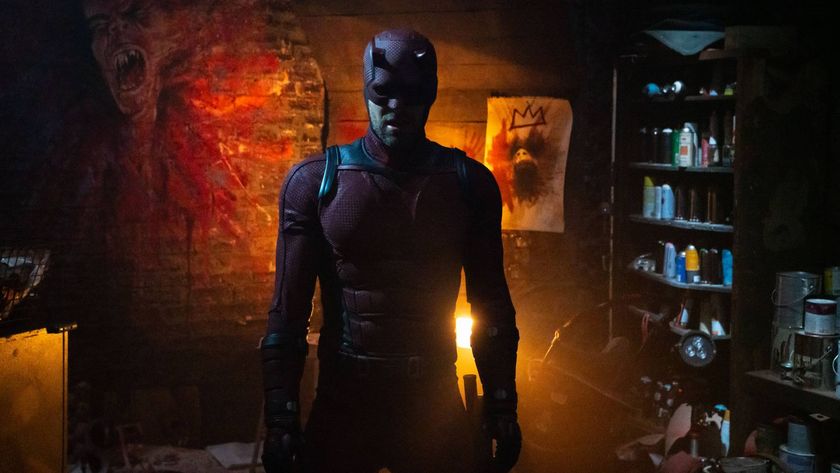
It’s a brave man who’ll take on a remake of an all-time classic – in which case, Rob Zombie (director of House of 1000 Corpses and The Devil’s Rejects) must be extremely courageous. John Carpenter’s slasher classic Halloween is widely regarded as one of the best horror films of all time. Zombie’s new take on the story hits cinemas today.
Where did you get the idea of looking at Michael Myers as a child?
“Good question. Well, I think that when the Halloween thing came up I was excited about the idea of making a movie with the character of Michael Myers but I was kind of burnt out on Michael Myers from all the bad movies. It was ‘what can we do to reinvigorate this character that has been around for 30 years?’ And I thought if we gave him a full-blown backstory then it would seem different.”
Did you study case histories of real killers?
“Yeah, but first I started with some of the dialogue that Donald Pleasance says in Halloween and how he described Michael Myers. And I thought ‘well, okay, if this was true, what would this person be?’ And he’s basically describing a psychopath and I started researching that. Does someone become a psychopath? Are they born a psychopath? And it seemed to be that if Michael Myers was a real person he would have been born that way and it would have manifested itself at a very early age and that’s why I started [the story] then because he would already have had those traits as a child. And mostly you know, kids don’t normally kill kids, they start off with killing animals. So that’s why I started with playing on the thing that he kills animals and then steps it up and kills that first kid and that takes him over the edge.”
There’s one point where he renounces humanity and stops talking. Was that something you found in your studies?
“No, not really. Maybe that happens, maybe it doesn’t. There wasn’t a lot of stuff I could find on child psychotics, I don’t know how common it is but basically I had to work backwards. I had this kid and I knew he had to end up as Michael Myers the adult. And at that point I knew I wanted him to speak less and less and less to the point where he didn’t speak at all and lived through these masks. He hid behind these masks and slipped deeper and deeper into this psychotic world.”
This film is a lot more graphic. What sort of dialogue do you have with yourself about what you can and can’t show?
“Well, I don’t really worry about stuff like that. I just wanted to show enough where it seems real but not so it seems gratuitous - like it’s supposed to be fun. It bothers me when violence in movies somehow is supposed to be fun, whether it’s gunfights or beheadings, anything. If there is going to be violence it should seem horrible because violence is horrible - so I wanted it to seem horrible. I never wanted there to be any moment in the movie when something would happen and the audience would cheer, like sometimes that happens in certain types of horror movies. I was never a fan of that. I wasn’t looking for ‘inventive’ kills. I hate that word because, y’know, if you have these characters screaming or crying in pain I don’t think anyone should be jumping out of their seat cheering. It should be horrible and you should feel sick watching it because that’s what it is, sick.”
Well, then why are you fascinated making movies that are filled with violence?
“Well, I don’t think there is anything wrong with watching it but I just think you have to present it in the appropriate light. It’s how you present it. I mean, you couldn’t watch this movie and say ‘oh, well he’s clearly saying this is appropriate behaviour...’ But with some movies you get that feeling. I remember when House of 1000 Corpses was having problems when it was at Universal and I was like ‘You know what the problem is going to be? It’s going to be that movie The Fast and The Furious. This is going to get kids killed not House of 1000 Corpses.’ Because this is going to be something that looks like ‘man, it’s so fun to drive your car fast and all the hot chicks will love you..’ And I was like, ‘Just watch how many accidents and deaths this causes’. Whereas I don’t think anybody is going to go ‘Oh I just saw The Shining I think I’m going to go axe somebody…’ And these movies aren’t for everybody. The dark side of anything isn’t for everybody. Some people hate these movies and they are like, ‘I can’t watch horror movies, they make me so sick and I won’t sleep for a month.’ I do think that you have to have some sort of responsibility in how you portray it because I always want the violence to seem real and if seems disgusting, good, because it should.”
Can you talk about your choice of Scout Taylor-Compton to play Laurie Strode?
“Scout was the first person I saw and I wanted to cast her immediately but I know that would be impossible because everybody had built up this mythical idea of the Laurie Strode character to a point that was insane. To the point where I was going, ‘Look, you guys wouldn’t have cast Jamie Lee Curtis either, you’ve blown it so out of proportion...’ You have to go with your gut as to who you feel would be right. And you know, playing the game, I looked at nine million girls for Laurie Strode but I was keeping an open mind, too, and thinking ‘Well, maybe someone else will come along that I like better...’ But nobody ever did. I thought she had that likeable but vulnerable quality and she was fresh and different. She just had something special. Nothing against the other girls, but a lot of them seemed fake to me, whereas she always seemed very real.”
Sign up to the SFX Newsletter
Get sneak previews, exclusive competitions and details of special events each month!
Did her screaming ability come into it?
(Laughs) “No, I never even thought about it. For some reason I assumed she could scream. What I liked about her was that a lot of the girls, when they auditioned, we would have a scary scene and they would be a little scared but would just, like, crumble. She just went limp and it seemed so real. When people get scared they whimper and cry and make funny faces.”
How did it work with Daeg Faerch [the child actor who plays the young Michael Myers)? Did you try to protect him from some of the heavier stuff?
“No, I didn’t at all. Maybe I should have, but I don’t know... it was funny, he was another one that was perfect. When I was casting kids they all just seemed like child actors. And he came in and seemed like a real kid. And he looked perfect because every kid had short hair and they were really cute and he comes in with long, stringy hair and he was really pale and I was like, ‘Wow, he looks totally different..’ And he’s the same age as the other kids in the movie but he seems so much older. He always had his mom with him and before we would shoot, he would say ‘Mom, I love you...’ He was so sweet but he was so different at the same time. He was also so unaffected by Hollywood.”
You weren’t tempted to make him a young quiet kid?
“No, I thought the young quiet kid would be boring. And what I liked about Daeg is that he seemed so sweet when he was trying to be sweet but is also totally manipulative. It’s like, he does love his mother but he is manipulating her at the same time. And when he is with the headmaster in the school he is a little shit. For me, to have him as this quiet kid in a nice family wasn’t it. I wanted him to come from a really rough background so that when he grows up and comes to Haddonfield, where his baby sister has been adopted into the really upscale nice family, it’s like she can’t escape her horrible past.”
There are some nods to the original movie in your movie…
“A couple of things, yeah.”
Talk about the balance between paying respect to that and going your own way...
“Well, that’s always the trick with anything that is a remake. How much do you want to make that is brand new and how much to you want to keep that is original? And I had no pressure from the studio to keep anything from the original. If I had changed every single thing in the movie, they didn’t care. In fact, they kept pushing me to change more things. It was my decision to keep the classic Michael Myers mask and make it Haddonfield and keep Dr Loomis and all these things. I kept trying to think about it as a fan. I was a fan of Halloween and am a fan. So I was like, ‘What would I want to see? Would I want something completely different where there’s no Laurie? No Dr Loomis?’ Eighty per cent of the movie is new but it’s kind of fun to see the ghost with the sheet and a couple of little bits and pieces like having the Linda character say ‘totally.’ So I tried to hold on to things here and there that were like the key fan moments.”
Have you shown the movie to John Carpenter yet?
“No, I talked to John a couple of days ago when I was going to screen the finished movie for the first time and he was going out of town so he couldn’t see it. Hopefully he’ll see it soon. I’m excited. I want him to see it.”
You said that some of the Halloween sequels weren’t so good. What was wrong with them and what makes yours better?
“Well, I don’t really like to say what’s wrong with people’s movies because some people would love those movies. It’s the nature of the beast, but once something has become the seventh sequel it’s going to become by-the-numbers, no matter how hard you try. And I think the problem was there were never any characters to care about. Michael Myers was lost in the background, a stuntman in a rubber mask. And they just introduce a bunch of new young teens, and try and come up with a wacky scenario, I don’t know, it just didn’t interest me.”
Would you be interested in a sequel?
“No. I did everything I wanted to do with this movie. They’ll probably make another one and that’s fine but I don’t really want to. I tried to make this one so people felt like it got an ending. Even though even if we chopped Michael Myers and launched the pieces into space, there still would be a sequel - suddenly all the pieces would reform in space and come back to Earth. I wanted something where people felt like they got a finished movie because nothing is more annoying than you watch a whole movie and get to the last second and you go ‘Oh come on...’”
Most of your films are in the horror genre - where does your fascination with it come from?
“Truthfully, I’m not really sure because I’ve been so fascinated by it since I was a little kid - I don’t know why I was fascinated by it. I don’t know what it is, it’s hard to say. I remember when I was like five years old and my mum was reading Helter Skelter [a book about the Charles Manson killings] and I was looking at the pictures and I was fascinated by it, but in a weird way. In the original Helter Skelter book they have the crime scene photos but they are covered up, and there was nothing I wanted more at five years old than to see the actual photos. And I don’t know why, I just did.”
Are you constantly interested in what might be called dark, morbid subjects?
“No, I like everything. I like stuff that’s good. I’ll enjoy watching King of Queens as much as I’ll enjoy watching The Texas Chain Saw Massacre. I like all kinds of movies.”
Why does an audience like to be scared, do you think?
“People just like the thrill of anything. Dangerous things and dark things are exciting, y’know, and it’s kind of like watching Deadliest Catch [a Discovery Channel series about crab fishers], y’know? I don’t actually want to go on a crab fishing boat but it’s pretty exciting to watch it and think, ‘Wwow those guys are fucking out of their minds!’ It’s kind of the same thing to safely experience dangerous situations. And there is something fun about that. As a kid, I knew I wasn’t going to get killed if I went into the Haunted House but you kind of feel like you are. And when it comes out the track the other side, it’s like, ‘We’re still alive!’ And I find it really funny when adults get really scared because I’ve not been really scared since I saw Jaws when I was a little kid. I just think people like the thrill of it, they like to feel like they accomplished something, that they survived the movie.”
What do you get scared by?
“Nothing. Nothing bothers me.”
What do you generally do on Halloween?
“I don’t generally do anything that great. Halloween is kind of funny, it gets built up to this big day. Last year we had trick or treaters in our neighbourhood so we always do that and that’s the thing that seems most like Halloween. But our house looks kind of scary so a lot of the kids won’t come up the front steps [laughs]. At night it looks scary just the way it’s set up – the trees all overgrown outside, long steps up to the house, so it’s like you’re walking through this tunnel. During the day it looks nice but at night it’s like you are walking through Sleepy Hollow.”
How is your next film, The Haunted World of El Superbeasto, coming along?
“It’s almost finished. The animation is done, finally, and now we have to finish the music and sound affects and I guess it will be out early next year, I haven’t really thought about it. But that’s totally different, it’s a ridiculous comedy and Paul Giamatti plays Dr Satan and he’s hilarious, he’s so funny!”
SFX Magazine is the world's number one sci-fi, fantasy, and horror magazine published by Future PLC. Established in 1995, SFX Magazine prides itself on writing for its fans, welcoming geeks, collectors, and aficionados into its readership for over 25 years. Covering films, TV shows, books, comics, games, merch, and more, SFX Magazine is published every month. If you love it, chances are we do too and you'll find it in SFX.
Most Popular







